| Srl | Item |
| 1 |
ID:
119976
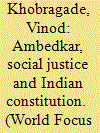

|
|
|
| 2 |
ID:
129416
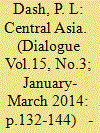

|
|
|
|
|
| Publication |
2014.
|
| Summary/Abstract |
In 2011-2012 all Central Asian countries have celebrated 20th year of their independence. They have achieved commendable progress in all spheres of their life during these years. Getting over from the monolithic ideology of communism, they have shifted to something that is not similar to any system. However, three areas are clearly discernible in the transition process of the last two decades: economy, society and ideology. The economy is no longer the command socialist economy. It is opening up, in some areas rapidly and in others slowly. Predominant private economic activities are visible in the market places. In laying the foundation of modern industry they are less visible. Foreign Direct Investment has been steadily flowing with varying degree of success in each country depending how investment savvy the FDI rules have been. The State has retained control over all spheres of economic activities. The society is no longer the communist one with free education and kindergarten, full employment guarantee to all, free housing, free medical care and many other benefits. All these have vanished. Everyone has to
fend for himself and his family. This is where it has created a schism between the haves and the have-nots thereby polarizing the society into rich and the poor. In the ideological realm, the Marxist-Leninist ideology has been completely given up. Even in academic libraries it is hard to find the works of Marx and Lenin that once adorned the shelves. Instead, works of incumbent presidents occupy the stacks. There is an irony: what the people wish to preserve, the presidents do not desire to protect.
|
|
|
|
|
|
|
|
|
|
|
|
|
|
|
|
| 3 |
ID:
046766
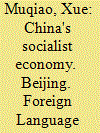

|
|
|
|
|
| Publication |
Beijing, Foreign Language Press, 1981.
|
| Description |
316p.
|
|
|
|
|
|
|
|
|
|
|
|
Copies: C:1/I:0,R:0,Q:0
Circulation
| Accession# | Call# | Current Location | Status | Policy | Location |
| 045579 | 335.951/MUQ 045579 | Main | On Shelf | General | |
|
|
|
|
| 4 |
ID:
061390
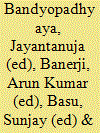

|
|
|
|
|
| Publication |
Calcutta, Minerva Associates (Publications), 1989.
|
| Description |
vii, 171p.
|
| Standard Number |
8185195250
|
|
|
|
|
|
|
|
|
|
|
|
Copies: C:1/I:0,R:0,Q:0
Circulation
| Accession# | Call# | Current Location | Status | Policy | Location |
| 043277 | 355.4/BAN 043277 | Main | On Shelf | General | |
|
|
|
|
| 5 |
ID:
109223
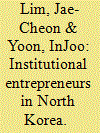

|
|
|
|
|
| Publication |
2011.
|
| Summary/Abstract |
This paper analyzes North Korea's private business entities that are considered to be "shadowy" for three reasons: First, shadowy private enterprises (SPEs) are "not officially recognized" as legitimate corporate entities by the government. Second, they are "not permitted to be registered" in the official enterprise list. Third, because of these two reasons, they are "ostensibly unidentified" under the country's socialist economy. The paper classifies SPEs into two categories: SPEs that are officially state-owned enterprises (SOEs) but are private in nature (financed and managed by private individuals) and those emerging in newly created economic areas. As institutional entrepreneurs, SPEs represent the interests of various market forces, leverage resources to develop market institutions, and contribute to the transformation of economic institutions. This article was funded by Korea University.
|
|
|
|
|
|
|
|
|
|
|
|
|
|
|
|